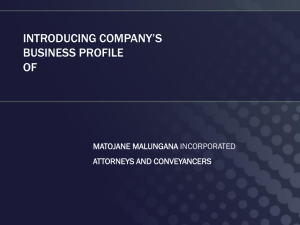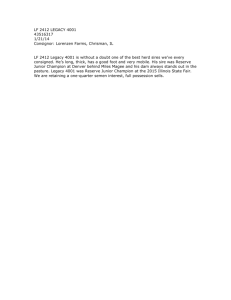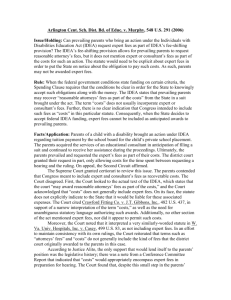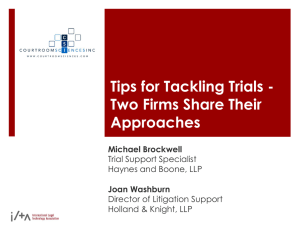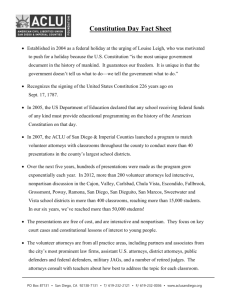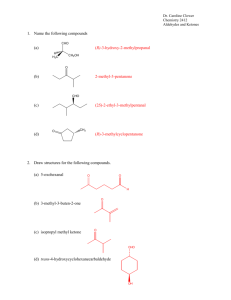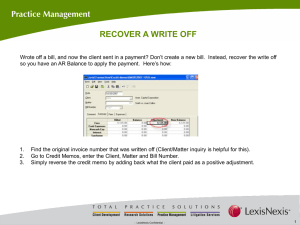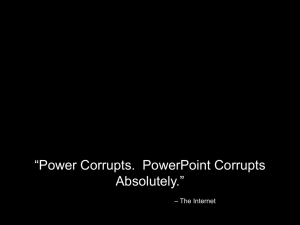chapter 11 attorneys` fees under the equal access to justice act
advertisement
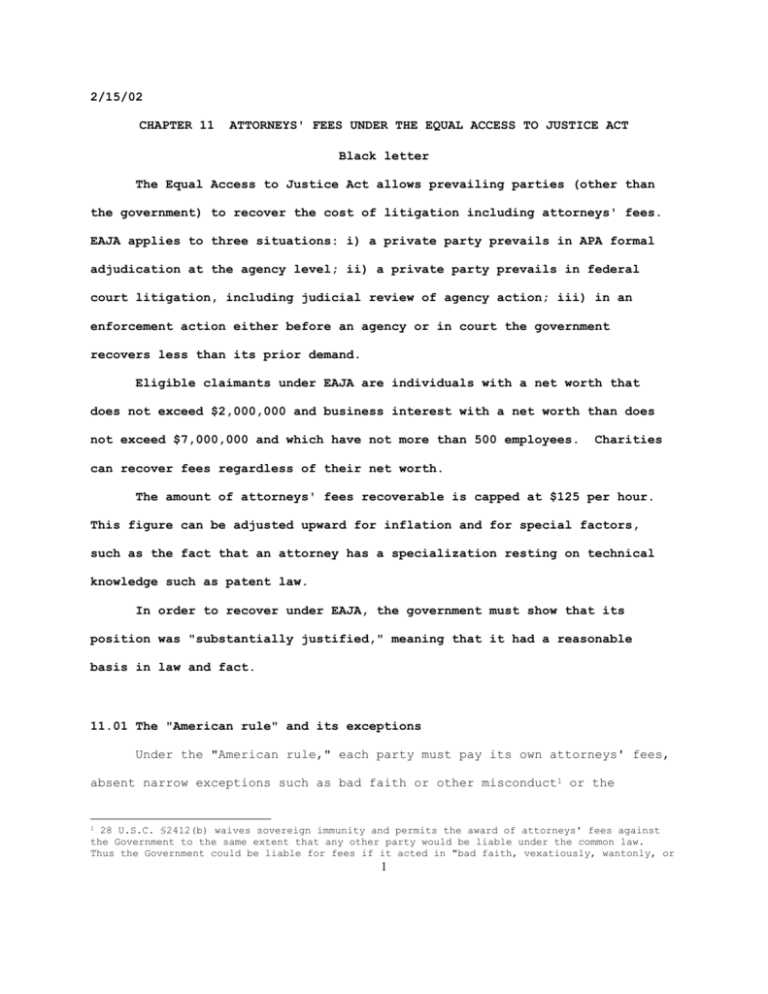
2/15/02 CHAPTER 11 ATTORNEYS' FEES UNDER THE EQUAL ACCESS TO JUSTICE ACT Black letter The Equal Access to Justice Act allows prevailing parties (other than the government) to recover the cost of litigation including attorneys' fees. EAJA applies to three situations: i) a private party prevails in APA formal adjudication at the agency level; ii) a private party prevails in federal court litigation, including judicial review of agency action; iii) in an enforcement action either before an agency or in court the government recovers less than its prior demand. Eligible claimants under EAJA are individuals with a net worth that does not exceed $2,000,000 and business interest with a net worth than does not exceed $7,000,000 and which have not more than 500 employees. Charities can recover fees regardless of their net worth. The amount of attorneys' fees recoverable is capped at $125 per hour. This figure can be adjusted upward for inflation and for special factors, such as the fact that an attorney has a specialization resting on technical knowledge such as patent law. In order to recover under EAJA, the government must show that its position was "substantially justified," meaning that it had a reasonable basis in law and fact. 11.01 The "American rule" and its exceptions Under the "American rule," each party must pay its own attorneys' fees, absent narrow exceptions such as bad faith or other misconduct1 or the 1 28 U.S.C. §2412(b) waives sovereign immunity and permits the award of attorneys' fees against the Government to the same extent that any other party would be liable under the common law. Thus the Government could be liable for fees if it acted in "bad faith, vexatiously, wantonly, or 1 creation of a common fund as in a class action.2 This rule applies to adjudication against the federal government; a prevailing party (whether or not it might qualify as a "private attorney general") cannot recover attorneys' fees from the government.3 However, a large number of specific federal statutes provide that prevailing parties are entitled to a fee award.4 11.02 The Equal Access to Justice Act5 Under the Equal Access to Justice Act (EAJA), enacted in 19806 and amended several times, Congress departed substantially from the American rule. EAJA provides for the recovery by a prevailing party7 (other than the Government) of reasonable attorneys' fees and other expenses such as expert witness fees or investigation costs. (¶¶11.03, 11.04, 11.05) Eligible claimants are basically those individuals or small business who lack sufficient assets to litigate against the government without help. (¶11.06) There is a $125 per hour cap on recovery of attorneys' fees. (¶11.07) The prevailing party is entitled to such recovery unless the Government's for oppressive reasons." F. D. Rich Co. v. United States ex rel Industrial Lumber Co,. 417 U.S. 116, 129 (1974). Fees awarded under §2412(b) are not subject to the $125 per hour cap imposed by EAJA as discussed in ¶11.07. See Mendenhall v. NTSB, 213 F.3d 464, 467 (9th Cir. 2000). However, §2412(b) covers costs incurred in federal court litigation, but not costs incurred during litigation before an agency. Id. at 467-69. 2 See Brzonkala v. Morrison, 272 F.3d 688, 691-92 (4th Cir. 2001) (finding common-benefit theory inapplicable to case invalidating federal violence against women act). 3 Alyeska Pipeline Serv. Co. v. Wilderness Society, 421 U.S. 240 (1975); Unbelievable, Inc. v. NLRB, 118 F.3d 795 (D.C.Cir. 1997) (NLRB has no power to order that private party pay agency's litigation costs even though party acted in "egregious bad faith."). 4 See, e.g., Internal Revenue Code §7430; Freedom of Information Act, 5 U.S.C.§552(a)(4)(E); Civil Rights Attorney's Fees Act, 42 U.S.C. §1988. Discussion of these statutes is beyond the scope of this book. 5 See generally Harold J. Krent, Fee Shifting Under the Equal Access to Justice Act--A Qualified Success, 11 Yale L. & Pol. Rev. 458 (1993); Gregory C. Sisk, The Essentials of the Equal Access to Justice Act: Court Awards of Attorney's Fees for Unreasonable Government Conduct (Part One), 55 La. L. Rev. 217 (1994); (Part Two), 56 La. L. Rev. 1 (1995). 6 Pub. L. 96-481, 94 Stat. 2325 (1980). 7 A party prevails when "actual relief on the merits of his claim materially alters the legal relationship between the parties by modifying the defendant's behavior in a way that directly benefits the plaintiff." Farrar v. Hobby, 506 U.S. 103, 111-12 (1992). However, a prevailing party must prevail on the merits of at least some of its claims through a judgment or consent decree. A party is not entitled to a fee award simply because litigation brought about the desired effect through a voluntary change in defendant's conduct. Buckhannon Board & Care Home, Inc. v. West Virginia Dep't of Health & Human Resources, 121 S.Ct. 1835, 1840-43 (2001). See generally Judith E. Kramer, Equal Access to Justice Act Amendments of 1996: A New Avenue for Recovering Fees from the Government, 51 Admin. L. Rev. 363, 366 n. 19 (1999). 2 position was "substantially justified" or special circumstances make an award unjust." (¶11.08) The purposes of EAJA are "encouraging private parties to vindicate their rights and curbing excessive regulation and the unreasonable exercise of Government authority."8 EAJA applies in three distinct situations: A private party prevails in formal agency adjudication.9 (¶11.03) A private party prevails in federal court litigation.10 (¶11.04) The government recovers less than its previous demand from a private party in either agency formal adjudication or federal court litigation.11 (¶11.05) 11.03 Formal agency adjudication Under 5 U.S.C. section 504, a prevailing private party is entitled to recover the costs of "adversary adjudication," which means formal agency adjudication under the APA.12 However, section 504 does not cover the costs of ratemaking or granting or renewing a license and it applies only in cases in which the government is represented by counsel or otherwise.13 Because the Government is not represented by counsel or otherwise in Social Security cases, section 504 of EAJA is normally inapplicable to such cases.14 8 Commissioner, INS v. Jean, 496 U.S. 154, 164-65 (1990); Krent, note xx at 458. 5 U.S.C. §504 10 28 U.S.C. §2412(d)(1)(A). 11 5 U.S.C. §504(a)(4); 28 U.S.C. §2412(d)(1)(D). 12 §504(b)(1)(C). 13 Id. 14 Sullivan v. Hudson, 490 U.S. 877, 891-92 (1989). However, §2412(d) is applicable to costs incurred by a claimant who prevails on judicial review of a negative determination by SSA. Normally, only the costs at the judicial review stage can be recovered. There is a narrow exception: where the reviewing court retains jurisdiction over a case remanded to SSA, the court can also award fees for the costs of post-remand proceedings before SSA. Sullivan v. Hudson, supra at 883-93 (allowing post-remand costs before SSA where district court remanded but retained jurisdiction). 9 3 Section 504 is limited to APA formal adjudication, meaning only those adjudications in which a statute15 called for a "hearing on the record."16 Thus EAJA does not apply to cases of adjudication (however adversarial or formal they may be in fact) to which the APA formal adjudication provisions do not apply. Since immigration proceedings are not governed by the APA (even though they entail a hearing on the record), EAJA does not apply to such cases.17 Under section 504, the decision about fee recovery is made by the adjudicative officer (normally an ALJ) who presided at the merits hearing.18 The agency heads have power to make the final decision at the agency level. The private party can appeal the agency's decision concerning fee recovery but the Government cannot appeal.19 Illustrations: 1. A's license is revoked by Agency M. At an adversarial hearing in which M is represented by counsel, the ALJ overturns M's determination. agency heads uphold this determination. The A incurs attorneys' fees and other costs $50,000 in winning back his license. The APA is not applicable to Agency M licensing cases because no statute calls for a hearing on the record. A court would probably hold that EAJA does not entitle A to recover attorneys' fees.20 2. Assume same facts as Illustration 1 except that A is seeking a new license. Assume further that a statute requires that M provide a hearing on 15 In Collord v. Dep't of Interior, 154 F.3d 933, 935-37 (9th Cir. 1998), the court held that EAJA applied to a hearing that was required by due process rather than the APA. See ¶3.02 which questions the current viability of this approach. 16 See ¶3.01. See, e.g., Lane v. USDA, 120 F.3d 106 (8th Cir. 1997) (APA applies to hearings conducted by USDA's National Appeals Division so prevailing party is entitled to an EAJA fee award). 17 Ardestani v. INS, 502 U.S. 129, 132-39 (1991). 18 §504(b)(1)(D). 19 §504(c)(2). 20 But see Collard case in note xx which states that EAJA applies to cases in which a hearing is required by due process. 4 the record. Section 504 of EAJA does not apply to adjudications for the purpose of granting a license. 11.04 Federal court litigation against the federal government Under 28 U.S.C. section 2412(d)(1)(A), a court shall award to a prevailing party fees and expenses incurred in any civil action (except a case sounding in tort)21 brought by or against the United States, including judicial review of agency action.22 Where a party who lost at the agency level prevails on judicial review, section 2412(d) permits an award of costs incurred at both the agency and judicial levels, but only if section 504 would have permitted a recovery of costs at the agency level. In other words, EAJA allows recovery of costs incurred at the agency level only in cases of agency formal adjudication, whether the party won at the agency level or lost at the agency level but prevailed on judicial review.23 Illustrations: 3. agency M. Assume the same facts as Illustration 1 except that A loses before However, A prevails on judicial review. requirements are satisfied, EAJA applies. Assuming other A can recover his attorneys' fees incurred on judicial review but not the costs incurred before Agency M.24 4. Assume the same facts as Illustration 3 except a statute requires Agency M to furnish a hearing on the record before revoking a license. Assuming other EAJA requirements are satisfied, A can recover his attorneys' fees incurred at both the judicial review and administrative levels. 11.05 Enforcement actions brought by the government 21 An action for negligence and breach of fiduciary duty against directors of a failed bank sounds in tort so EAJA is inapplicable. Resolution Trust Co. v. Gaudet, 192 F.3d 485 (5th Cir. 1999). 22 Agency action for this purpose is not limited to formal adjudication. 23 §2412(d)(3) 24 But see note xx (if a court holds that the APA formal adjudication provisions are triggered by due process, the hearing before Agency M would be adversary adjudication and A could recover fees 5 Sections 504(a)(4) and 2412(d)(1)(D) apply to enforcement actions brought by the government against a private party, either in an agency formal adjudication or in court. The right to recover fees is triggered if (i) the Government's demand25 was substantially in excess of the agency decision or judicial judgment it finally obtains, and (ii) the Government's demand was unreasonable when compared with such judgment. These provisions were added by 1996 amendments to EAJA.26 In such cases, the agency or the court can award fees and other expenses related to defending against the excessive demand unless the private party has committed a willful violation of law or otherwise acted in bad faith or special circumstances make an award unjust.27 For example, an action to recover civil penalties falls under these sections. In addition, other sorts of demands might be covered. For example, an agency might demand that a party cease and desist from a wide range of activities; at the hearing or trial, the decisionmaker issues a cease and desist order for only a small part of these activities. If the original demand is considered unreasonable in comparison with the judgment, EAJA might apply. Illustration: 5. Agency N asserts that B owes a civil penalty of $1,000,000. By statute, Agency N adjudicates civil penalty cases and must employ APA formal adjudication. After a hearing, it is determined that B owes a penalty of only $5000. It is further determined that B's conduct was not willful. incurs attorneys' fees of $50,000 in resisting N's penalty demand. B Assuming incurred before Agency M. 25 See Kramer, note xx at 380-83, discussing various unresolved issues relating to what is a "demand" and which"demands" are compared to the ultimate judgment. 26 P.L. 104-121, §232(a). 27 504(a)(4), 2412(d)(1)(D). See Judith E. Kramer, Equal Access to Justice Act Amendments of 1996: A New Avenue for Recovering Fees from the Government, 51 Admin. L Rev 363, 379-88 (1999). 6 the other requirements of EAJA are met, a court might find that the government's demand was unreasonable when compared to the ultimate judgment and therefore rule that B is entitled to recover attorneys' fees under EAJA. 11.06 Eligible claimants Both sections 504 and 2412(d) permit attorneys' fee awards only to a limited class of parties who are considered to need assistance in litigating against the government.28 Broadly speaking, awards can be made only to an individual whose net worth did not exceed $2 million at the time the action or agency adjudication was filed29 or to a business, organization,30 or local government unit whose net worth did not exceed $7 million and which had not more than 500 employees. However, tax exempt charitable organizations (such as most public interest law firms) qualify regardless of their net worth.31 In the case of EAJA recoveries where the agency has made an excessive monetary demand (¶11.05), there is an additional class of eligible claimants: a small entity as defined in 5 U.S.C. section 601.32 In order to be an eligible claimant, the prevailing party must satisfy the strict timing provisions of EAJA. A party seeking an award of fees must submit an application containing an itemized statement to the agency or court within thirty days of final disposition of the matter.33 28 §§2412(d)(2)(B), 504(b)(1)(B). A decedent's estate is treated as an individual under this provision, but the determination of whether its net worth exceeded $2,000,000 on the date of filing must include distributions made to beneficiaries prior to filing. Estate of Woll by Woll, 44 F.3d 464 (7th Cir. 1994). 30 A trade association whose assets were less than $7 million qualified even though its members were corporations that were vastly larger than that amount. Texas Food Industry Ass'n v. USDA, 81 F.3d 578, 580-82 (5th Cir. 1996). 31 In addition, agricultural cooperatives qualify regardless of their net worth. 32 §504(b)(1)(B). This phrase refers to a "small business concern"(meaning one that is not dominant in its field of operation) as well as a "small organization," or "small government jurisdiction." See Kramer, note xx at 377-78. 33 Section 504(a)(2) (within 30 days of final disposition of the adversary adjudication); §2412(d)(1)(B) (within thirty days of final judgment in the action). The application of these timing provisions has caused much difficulty in Social Security cases remanded from federal courts to SSA. See Shalala v. Schaefer, 509 U.S. 292 (1993) (30-day period under §2412(d) runs from date that District Court decision remanding case to Social Security without retaining jurisdiction becomes final and non-appealable); Melkonyan v. Sullivan, 501 U.S. 89 (1991) (30 day period runs from post-remand judgment of District Court, where court remanded to agency while 29 7 Illustration: 6. Agency O seeks to revoke C's license. C is a business partnership having a net worth of $4,000,000 and 515 employees at the time O's action was filed. C prevails before Agency O and the license is not revoked. C is not entitled to a recovery of fees under EAJA because it has more than 500 employees. 7. Assume same facts as Illustration 6 except that C is a tax-exempt charity and C has a net worth $ 9,000,000. of fees under EAJA. C is not entitled to a recovery Charities are not subject to the $7,000,000 net worth requirement but are subject to the requirement that they have not more than 500 employees. 11.07 Amount of recovery The amount which can be paid under sections 504 and 2412(d) includes the cost of expert witnesses, the costs of necessary studies or tests, and reasonable attorney fees,34 but not the salaries of regular employees of the prevailing party who worked on the case.35 The prevailing party who is compelled to expend additional resources litigating about fees ("fees on fees") is entitled to recover fees expended in doing so.36 However, attorney fees cannot exceed $125 per hour unless it is determined that an increase in the cost of living or a special factor (such retaining jurisdiction). 34 Section 504 covers the cost of "attorney or agent fees." Thus the cost of a lay representative may be recovered. Section 2412(d), however, does not cover the cost of "agents." Cook v. Brown, 68 F.3d 447, 451 (Fed. Cir. 1995) (fees paid to lay representative recoverable under §504 but not §2412). 35 Fanning, Phillips, & Molnar v. West, 160 F.3d 717, 720-22 (Fed.Cir. 1998). 36 See Commissioner, INS v. Jean, 496 U.S. 154, 158-66 (1990) (prevailing party entitled to recover fees incurred in litigating about fees whether or not the Government had "substantial 8 as limited availability of qualified attorneys for the proceedings involved) justifies a higher fee. In the case of section 504, the payment of any amount in excess of $125 per hour must be provided for by regulation.37 In the case of section 2412, however, such amounts are determined by the court independently of agency regulations. The $125 per hour figure is far below the amount currently charged by big city law firms. Nevertheless, it is difficult to avoid the cap on the basis of a "special factor." The exception for "limited availability" does not refer to whether there is a scarcity of attorneys willing to work for $125 per hour. Instead, it refers to attorneys whose availability is limited because they possess some distinctive knowledge or specialized skill needed in the particular litigation. For example, a specialty like patent law or knowledge of foreign law or language might qualify.38 The term "special factor" does not include the novelty and difficulty of the issues, the undesirability of the case, the quality of work and ability of counsel, the general market rates, nor the results obtained. Nor does it include the contingent nature of the fee.39 The $125 figure can also be increased by reason of increases in the cost of living since 1996 (the time when the revised $125 cap became justification" for its position resisting payment of the fees). 37 504(b)(1)(A). 38 Pierce v. Underwood, 487 U.S. 552, 572 (1988). This language in Pierce has given rise to uncertainty when applied to attorneys in specialized fields that lack a technical background such as is needed to practice patent law. Most decisions have indicated that mere specialization is not enough. See F. J. Vollmer Co. v. Magaw, 102 F.3d 591, 598-99 (D.C.Cir. 1996) (specialization in firearms law does not qualify for enhancement because no specialized training); Perales v. Casillas, 950 F.2d 1066, 1078 (5th Cir. 1992) (same for immigration law). However, the Ninth Circuit does permit enhancement because the attorney has developed expertise through a specialized field of law practice needed in the litigation. See Pirus v. Bowen, 869 F.2d 536, 542 (9th Cir. 1989) (specialization in Social Security); Love v. Reilly, 924 F.2d 1492, 1496 (9th Cir. 1991) (same for environmental law). 39 Pierce v. Underwood, 487 U.S. at 573. 9 effective). However, the inflation adjustment is measured at the time the legal services were rendered, not at the time the fee award was made.40 Normally, the EAJA recovery is based on the product of a reasonable hourly rate (not exceeding the cap) and the number of hours reasonably expended on the entire case. However, if a party prevails on some but less than all claims, it may be appropriate to scale down the amount of fees recoverable. First, if the party failed to prevail on claims that were unrelated to the claims on which he succeeded, a reduction is appropriate. Second, a reduction is appropriate if the success achieved seems less than commensurate with the number of hours expended.41 Moreover, any fee award can be reduced to the extent that the prevailing party engaged in conduct that unduly and unreasonably protracted the final resolution of the matter in controversy.42 Illustrations: 7. After an APA formal adjudication, Agency P rules that D's brokerdealer license should not be revoked. D was represented by Attorney E who bills D at her normal rate of $300 per hour. lawyers charge $300 per hour. All competent securities Assuming the other requirements of EAJA apply, Agency P will be required to pay E's fees, but the cap will probably apply since E lacks specialized technical training even though she is an expert in securities law.43 Thus D can be reimbursed at a rate of not more than $125 per hour (adjusted for inflation since 1996). 11.08 Substantial justification 40 Perales v. Casillas, 950 F.2d 1066, 1074-77 (5th Cir. 1992). Hensley v. Eckerhart, 461 U.S. 424, 434 (1983); Vollmer, 102 F.3d at 599-600 (reimbursement of only 70% of hours where plaintiff is only partially successful). 42 §§504 (b)(1)(E); 2412(d)(1)(C). 43 See note [36] supra, recognizing a split in authority on this issue. 41 10 Under both sections 504 and 2412(d), the government has the burden to show that its "position" was "substantially justified."44 For this purpose, the government's "position" includes both its litigating position before the agency or the court and also the original action, or failure to act, on which the subsequent administrative and judicial litigation was based.45 "Substantially justified" means that the Government's position had a "reasonable basis in both law and fact."46 The Government's position can be "substantially justified" even if it lost the case because its action was found not to be supported by substantial evidence or to be arbitrary and capricious.47 Nevertheless, the preceding merits determination is highly relevant to the subsequent substantial-justification determination; it is difficult for the Government to prevail if the antecedent merits determination found its conduct to be unreasonable.48 In determining substantial justification, objective factors are relevant but not determinative. Thus the fact that the Government settled the case on unfavorable terms does not establish a lack of substantial justification since it might reflect such factors as a change in governmental policy.49 Nor is it established by the fact that the decisionmaker decided the case at the pleadings stage, since this may evidence only that the judge was efficient.50 Whether other courts have rejected the Government's position 44 F. J. Vollmer Co. v. Magaw, 102 F.3d 591, 595 (D.C.Cir. 1996). §§504(b)(1)(E), 2412(d)(2)(D). 46 The Government's position is substantially justified if it is "justified in substance or in the main--that is, justified to a degree that could satisfy a reasonable person. That is no different from . . . [having] a reasonable basis both in law and fact." Pierce v. Underwood, 487 U.S. at 565. 47 See Sotelo-Aquije v. Slattery, 62 F.3d 54, 58 (2d Cir. 1995). Sotelo-Aquije holds that "substantial justification" and "substantial evidence" are not congruent; a decision could lack substantial evidence yet still be substantially justified. 48 Sotelo-Aquije, 62 F.3d at 58 (Government has "high hurdle" to overcome antecedent finding that its position was unsupported by substantial evidence); Vollmer, 102 F.3d at 595; Hess Mechanical Corp. v. NLRB, 112 F.3d 146, 149 (4th Cir. 1997) (General Counsel's issuance of complaint based on very weak testimonial evidence that was rejected by ALJ--agency lacked substantial justification). 49 Pierce v. Underwood, 487 U.S. at 568. 50 Id. at 568-69. 45 11 is also relevant but not determinative.51 Instead, all facts and circumstances must be weighed to determine whether the Government's position had a "reasonable basis in both law and fact." Appellate courts review decisions of lower courts under section 2412(d) on the "substantial justification" issue under an abuse of discretion standard.52 This gives considerable power to the lower court judge. However, courts reviewing agency EAJA determinations under section 504 do so under the normal rules of scope of review such as the substantial evidence test.53 Illustrations: 8. F is charged with an unfair labor practice by agency Q. The general counsel of Q issued a complaint based on evidence provided by G who stated that F discharged G because of G's efforts to organize a union. claimed that G was discharged because of poor performance on the job. F Other than G's statement that he was discharged for union activities, no evidence supported G's position. Overwhelming evidence supported F's position. Q's ALJ ruled in favor of F thatno unfair labor practice occurred and the agency heads affirmed. Q could rule that Q's position lacked substantial justification and therefore could award attorneys' fees to F, assuming other EAJA requirements are met.54 51 52 53 54 Id. at 569. Pierce v. Underwood, 487 U.S. 552, 557-63 (1988). United Brotherhood of Carpenters & Joiners v. NLRB, 891 F.2d 1160, 1162 (5th Cir. 1990). Hess Mechanical Corp., note xx. 12
